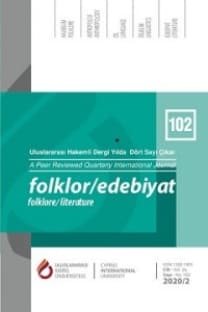Libya Öğrencilerinin Öğretmenlerin Etkili EFL Öğretmenlerinin Niteliklerine İlişkin Algıları
Bu araştırmada etkili dil öğretmenlerinin başarılı dil öğretimi ve öğrenme uygulamaları üzerindeki önemli etkisi üzerinedir. Bu çalışma, Lübnan üniversitelerinde aday öğretmen öğrencilerinin etkili dil öğretim algılarına dayanan niteliklerini ele almaktadır. Araştırmada hem nitel hem de nicel veri toplama araçlarını içeren çok yöntemli bir yaklaşım kullanılmıştır. Sonuçlara göre, Libyalı aday öğretmen öğrencilerinin şu maddelere önem verdikleri anlaşılmıştı: 1) gramer ve kelime bilgisi da dahil olmak üzere bilgi ve güvenilirliğe büyük önem verdiğini; 2) temel olarak öğrenci katılımını teşvik ederek ve öğrencinin özgüvenini artırarak eğitilmesi; 3) öğretmenin tarafsızlığı ile büyük ölçüde karakterize edilen dürüstlük; 4) öğrencilerin özellikle dikkat konusunda uyumlu olmarını; ve 5) her ders için önceden hazırlık yapılması ve öğretmenlerin ek materyal hazırlaması. Bulguların, öğretmen adaylarının ve dil öğretmenlerinin öğretmenlik uygulamalarını geliştirmeleri için önemli etkileri olduğu tespit edilmiştir.
Anahtar Kelimeler:
öğretmen adayları, algı, etkili dil öğretim özellikler, libya
Libyan Student Teachers’ Perceptions on the Attributes of the Effective EFL Teachers
Given the undeniable influence of effective language teachers on successful language teaching and learning practices, this study was set out to address the attributes of effective language teachers based on Libyan university level student teachers’ perception. A multi-method approach including both qualitative and quantitative means of data collection was employed in the study. Results indicated that Libyan student teachers placed high importance on 1) Knowledge and credibility including possessing the knowledge of grammar and vocabulary; 2) Delivery principally by encouraging student participation and increasing students’ self-confidence; 3) Fairness as mainly characterized by teacher impartiality; 4) Rapport specifically through features that involved care and attention students; and 5) Organization and Preparation as manifested by prior preparation for every lesson and provision of supplemental material by teachers. The findings have important implications for student teachers and language teachers to improve the efficiency of their teaching practices.
Keywords:
student teachers, perception, effective EFL teaching attributes, Libya,
___
- Barnes, D. B., & Lock.G. (2010). The attributes of effective lecturers of English as a foreign language asperceived by students in a Korean university. Australian Journal of Teacher Education, 35(1), 139-152.
- Barnes, B. D., & Lock, G. (2013). Student perceptions of effective foreign language teachers: A quantitative investigation from a Korean university. Australian Journal of teacher Education, 38(2), 19-36.
- Borg, S. (2006). The distinctive characteristics of foreign language teachers. Language Teaching Research, 10(1), 3-31.
- Brown, A. V. (2009). Students’ and teachers’ perceptions of effective foreign language teaching: A comparison of ideals. The Modern Language Journal,93(1), 46-60.
- Chen, R. (2005). Chinese tertiary students’ perceptions of a good EFL teacher. Sino-US English Teaching, 2(4), (Serial No. 16).
- Darling-Hammond, L., & Youngs, P. (2002). Defining “highly qualified teachers”: What does “scientifically-based research” actually tell us? Educational researcher, 13-25.
- Desai, S., Damewood, E., & Jones, R. (2001). Be a good teacher and be seen as a goodteacher. Journal of Marketing Education, 23(2), 136-144.
- Faranda, W.T., & Clarke I. (2004). Student observations of outstanding teaching: Implications for marketing educators. Journal of marketing education, 26(3), 271-281.
- Horwitz, E. K. (1988). The beliefs about language learning of beginning university foreign language students. Modern Language Journal, 72, 283-294.
- Kember, D., & Wong, A. (2000). Implications for evaluation from a study of students’ perceptions of good and poor teaching. Higher Education, 40, 69-97.
- Koutsoulis, M. (2003). The characteristics of the effective teacher in Cyprus public high school: The students' perspective. Arlington, VA: American Association of School Administrators.
- Kourieos, S., & Evripidou, D. (2013). Students’ perceptions of effective EFL teachers in university settings in Cyprus. English Language Teaching, 6 (11), 1-16.
- Lightbown, P. M., & Spada, N. (2008). How Languages are Learnt (3rd ed.). Oxford: Oxford University Press.
- Omar, Y., Z. (2014). Perceptions of selected Libyan teachers of English as a foreign language regarding teaching of English in Libya (PhD dissertation:University of Missouri, Columbia).
- Park, G.P.,& Lee, H.W. (2006). The characteristics of effective English teachers asperceived by high school teachers and students in Korea. Asia Pacific Education Review, 7(2), 236-248.
- Politzer, R. L., & Weiss, L.(1971). The Successful Foreign Language Teacher. Philadelphia, PA:The Center for Curriculum Development.
- Richardson, V. (1996). The role of attitudes and beliefs in learning to teach. In J. Sikula, T. J. Buttery, &E. Guyton (Eds.), Handbook of research on teacher education (pp. 102–119). New York: Macmillan LibraryReference.
- Salahshour, N., & Hajizadeh, N. (2013). Characteristics of effective EFL instructors. ProcediaSocial and Behavioral Sciences, 70, 163-173. White, W. F. (1989). Toward a psychology of pedagogy. Education,109 (4), 455-461.
- ISSN: 1300-7491
- Başlangıç: 1994
- Yayıncı: -
Sayıdaki Diğer Makaleler
4-6 Yaş Arasındaki Çocukların Ebeveynlerinin İstismara Yönelik Farkındalığı
Elif ÜNAL BOZCAN, Bengü BERKMEN, Nihan KORAN, Eşmen TATLICALI
Cemre ANLAYIŞLI, Nergüz BULUT SERİN
Figen YAMAN LESİNGER, Salim AKYÜREK, Hülya ŞENOL
İşitme ve Konuşma Engelli Bireyler için İşaret Tanıma Sistemi Geliştirme
Vasfiye KARABIYIK, Necla IŞIKDOĞAN UĞURLU
Her Zorluk Öğrenme Fırsatıdır: Öğrenci Öğretmenlerinin Öğrenme Deneyimleri
Sosyal Duygusal Öğrenme Çerçevesinde Öz Düzenleme Yabancı Dil Öğrenme Ölçeğinin Geliştirilmesi
Senem ZAİMOĞLU, Şehnaz ŞAHİNKARAKAŞ
Woolf’un Odasında Erkek Temsili
Çelen DİMİLİLER, Nurdan ATAMTÜRK
Öğretmenlerin Ve Öğretmen Adaylarının Mobil Eğitim Uygulamalarına Yönelik Tutumları
